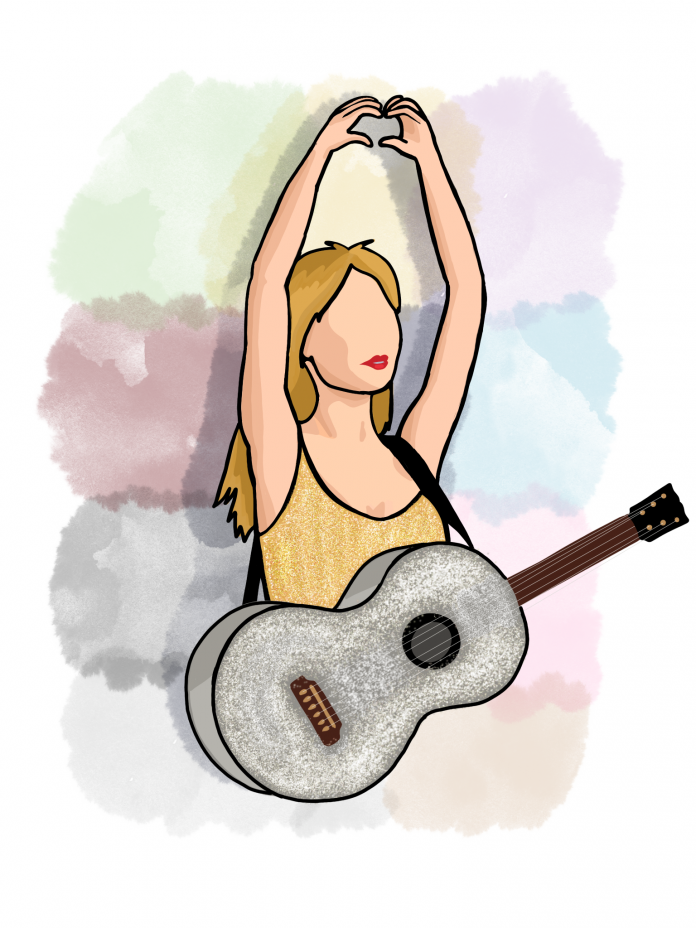Elizabeth Brady ’25 is a public policy major and an English minor, and she is a member of Alpha Chi Omega. She loves art, music and movies. Email her at eabrady@wm.edu.
The views expressed in this article are the author’s own.
If you’ve been anywhere, read anything or talked to anyone between the ages of 13 and 23 in the last week, you know that Taylor Swift and her longtime boyfriend Joe Alwyn allegedly broke up. The news started as a rumor that grew into a story that grew into a globally circulating headline. Now her millions of fans are collectively scream-crying and rolling around on the floor in agony.
Celebrity drama is many things, but it is definitely not new. Since the silent film era, us common folk have loved to voyeur in upon the lives (and especially the love lives) of the rich and famous. Taylor Swift’s relationship drama isn’t even new; the endless jokes about her rolodex of ex-boyfriends are as true as they are unfunny. But the reason this particular breakup seems to have people in shambles is what it means in relation to a lot of Swift’s most recent work.
Swift’s style of songwriting is personal, autobiographical and full of thinly veiled real-life anecdotes. Even songs that aren’t about her life are about her life. “The Last Great American Dynasty,” a song about the famous divorcee and socialite Rebekah Harnkess, is also about Swift’s experiences dealing with the “old money” crowd and the criticism that comes from being a “loud” woman who benefits from her hard-earned success. “Dear John” is thought to be an obvious jab at John Mayer. “All Too Well” is universally acknowledged as the sickest and most devastating dunk on Jake Gyllenhaal (“so casually cruel in the name of being honest”— come ON Blondie, you’re killing me here!!!), and her entire album “Lover” is thought to be a love letter to Alwyn, with “Lover,” “London Boy” and “False God” being the exhibits A, B and C.
Because her personal and artistic lives are so closely connected, a fracture in one causes a shift in the other. A common sentiment among Swifties is that Swift’s last few albums, largely speculated to be inspired by Alwyn, “won’t be the same anymore” now that they’ve ended things. Separating the art from the artists is a finicky and sometimes morally sticky attitude to have, but now is the right time to have it. The “Taylor Swift and Joe Alwyn broke up, so love isn’t real, and I can never listen to ‘Invisible String’ again,” mindset is so bleak. Even if they’re not in love anymore, they were at one point, and that’s cool enough as is; the purpose of a relationship is not always to last forever, it’s to be good while it lasts. Love is still real, and the song still bangs.
The intensity with which the news hit the Swiftie community raises enough questions on its own. Swift has been known to drop smirking, self-referential details to send hints to her fans, and this has sent Swifties into a flurry of clue-hunting for signs that they are (or aren’t) for sure broken up. Swift has cultivated a secret language for her hyper-fanatical in-crowd, turning outfit choices and the wording of tweets into a puzzle for them to solve. Her personal songwriting and relational closeness fostered by shared inside jokes makes her fans feel like they know her. Oftentimes, listening to her music feels like you and her are swapping stories at a sleepover long after the lights have gone out.
However, this feeling of intimacy is a double-edged sword. On one hand, it’s helped her create a rabid, protective ready-to-pay fanbase; on the other hand, it affords her very little privacy. Details have been misconstrued in the past, causing fans to hope for albums that aren’t coming and to encroach and speculate on her personal life, including constructing stories about a relationship between her and Karlie Kloss.
The internet created an easy way for people to find others who share the same interests, but fan communities on the internet have become a different beast entirely. Parasocial relationships are not an advent of the digital age. However, they are one of its primary features, and their strength and prevalence is only exacerbated by the social structures that comprise fan communities online. The kind of fans we have now are different; they feel like they personally know their celebrity of choice. It’s not enough to just like a celebrity — you have to know them and what they like.
Swift’s most recent breakup doesn’t hit her fans close to home because it’s especially fascinating or because they were especially invested in the health and longevity of her relationship. The reason it stings is that to them, Swift is not a distant figure, but someone they know intimately. They’ve been there through 17 years, 10 albums and 12 boyfriends. Her stories are their stories, her exes are their exes and now they’ve got one more.

